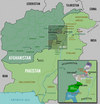|
Pakistan, Afghanistan, and the tribal areas. Map from PBS’ Frontline. Click to view. |
The Pakistani government has reinitiated peace negotiation with the Taliban in the lawless tribal agency of North Waziristan. The government is releasing “seven tribesmen as a goodwill gesture” to the Taliban, Dawn has reported. Meanwhile, the Afghan branch of the Taliban has denied Baitullah Mehsud has been removed at the leader of the Pakistani Taliban.
The provincial government of the Northwest Frontier Province is in active negotiations with what they are calling tribal leaders, but the agreement shows a deal is being cut with the Taliban. The militants extended a ceasefire initiated at the end of 2007, and “returned the weapons they had snatched during attacks on security forces,” Dawn reported. Twenty-two additional “tribal members” who were captured while fighting security forces will be released as terms of the deal. The Taliban has demanded the release of their fighters to restore the “peace accord.”
Even before the deal has been inked, the Pakistani Army is withdrawing from outposts in North Waziristan. “The government had withdrawn army and paramilitary troops from two checkpoints in the region and the tribal Khasadar force was checking vehicles,” sources told Dawn.
Former Northwest Frontier Province governor Ali Muhammad Jan Orakzai, who resigned in early January 2008, was a backer of holding peace talks with the Taliban. Interior Minister Hamid Nawaz Khan said Orakzai was relieved due to the failure of the Taliban peace negotiations as these agreements led to the spread of the Taliban and al Qaeda in the Northwest Frontier Province and the tribal areas. Yet the government continues to seek peace with the Taliban.
The Taliban took control of North Waziristan after the government signed the North Waziristan Accord in September 2006. The peace agreement ceded the region to the Taliban and al Qaeda control. The deal was negated by the Taliban in July 2007 during the siege of the extremist Lal Masjid, or Red Mosque, in Islamabad.
Senior al Qaeda operatives are believed to be operating in North Waziristan, including Hamza bin Laden — Osama bin Laden’s son and possible successor in al Qaeda — and Abu Kasha. In January 2007, an American military intelligence official told The Long War Journal that Abu Kasha is the key link between al Qaeda’s Shura Majlis — main Shura or consultive body — and the Taliban. Abu Kasha is an Iraqi Arab who runs his organization in Mir Ali. He has two local commanders, Imanullah and Haq Nawaz Dawar, who administer local al Qaeda offices. Abu Kasha has a working relationship and close communication with the Uzbeki terror groups, including the Islamic Jihad Group run by Najimuddin al Uzbeki, who also operates out of North Waziristan.
North Waziristan is also the home of Taliban commander Sadiq Noor, who runs his operations from Miramshah and hosts Taliban and al Qaeda meetings from his offices. Noor and his Taliban forces hold sharia courts, adjudicate local disputes, announce punishment, collect taxes, and run a private jail. Noor’s activities spread across the border into Afghanistan, where he supports terrorists in Khost.
|
Presentation on the Taliban leadership in Pakistan and Afghanistan. Baitullah Mehsud pictured. Click to view. |
Baitullah Mehsud, the leader of the Tehrik-i-Taliban Pakistan — the Movement of the Taliban in Pakistan — has denounced the peace talks and claimed the government is attempting to divide the Taliban.
Rumors that Baitullah has been dismissed by Mullah Omar as the commander of the Pakistani Taliban are incorrect, an Afghan Taliban spokesman told Dawn. “Baitullah is a Pakistani and we as the Afghan Taliban have nothing to do with his appointment or his expulsion,” said spokesman Zabihullah Mujahid. “We did not appoint him and we have not expelled him.” Mujahid is the same spokesman who first reported the dismissal of Afghan Taliban leader Mullah Mansoor Dadullah.
Mujahid claimed the Afghan Taliban could not fire Baitullah if it desired to do so. “Had he been an Afghan we would have expelled him the same way we expelled Mansoor Dadullah for disobeying the orders of Mullah Omar,” Mujahid said. “But Baitullah is a Pakistani Talib and whatever he does is his decision. We have nothing to do with it.”
“We have nothing to do with anybody’s appointment or expulsion in the Pakistani Taliban movement,” Mujahid continued. “There are mujahideen in Iraq who have taken baya’h [an oath of allegiance] to Mullah Omar and there are mujahideen in Saudi Arabia who have taken baya’h to him. So taking baya’h does not mean that Mullah Omar has direct operational control over them.”
Meanwhile, Pakistani military operations against Baitullah’s forces continue in South Waziristan. Heavy fighting has been reported in the Nawaz Kot, Kotkai, and Berwand regions of the tribal agency. “Security forces claimed to have cleared Shishamwan in the northeast of Kot Kai and militants suffered casualties and left the area,” Dawn reported. “Local Taliban spokesman Maulvi Omar … claimed that troops had suffered heavy casualties and lost control of the Nawaz Kot area. He said that the militants had also taken away the bodies of 10 security personnel.”
The Pakistani military launched an operation in South Waziristan on Jan. 24 after Taliban forces commanded by Baitullah overran two military outposts and conducted attacks against other forts and military convoys in the agency during the past several weeks. The Pakistani military is claiming great success, with scores of Taliban killed or captured and low casualties on the Pakistani military side. The reporting from South Waziristan has been largely limited to reports from the Inter Service Public Relations (ISPR), the Pakistani military’s public affairs outfit.
Al Qaeda, the Taliban, and allied terror groups operate at least 29 training camps in North and South Waziristan alone.
See The Fall of the Northwest Frontier Province for the full history of the rise of the Taliban and al Qaeda in Pakistan’s tribal regions and beyond.










6 Comments
Syed Saleem Shahzad has interesting article out in tomorrow’s Asia Times about U.S. Special Forces activities in Pakistan.
Asia Times: US homes in on militants in Pakistan
The Taliban seem to be having a rough go of it in Orakzai, though. Looks like some 18 tribes have formed a Lashkar against the Taliban there. I have to wonder if there is any truth in this report, though. All reporting out of Pakistan is suspect to me these days.
Something we should have done to kick this whole thing off…
What do they call this FOB overlooking Bajaur?
Syed Saleem Shahzad has another very interesting article out in the January 31 Asia Times about how South Waziristan-linked terror groups (outside of the Pakistani Taliban) had regrouped in all major Pakistani cities.
In case you’ve forgotten some of the other fronts in the Global War on Terror … UPDATED
Normally, I post on stories like this one.
I am changing tack a bit. Here’s a pictorial fact sheet of the main bad guys in the Caucasus front. Just as “Greens” and Anarchists violently protesting in Berlin made legendary war correspo…
If its true, and the p-stani’s are fighting, thats an about face. Wat iam interested in is this FOB that sits near the p-stani border. There should have been ops across the border from the start, and listening to Musharraff is as stupid as giving him $10BILLION. The ideal situation would be having aircraft that can strike targets Spec. Ops pickout. Whether it be a B1-B or a plane like an F-16 thats thier call. The Predator’s payload is only 2 Hellfire missles. Hit them where they sleep.